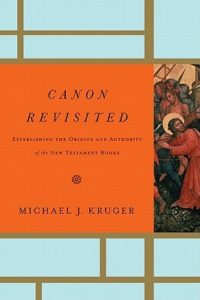Another subject people frequently bring up if you get into discussions about the Gospel is the very popular view that no one in early Christianity could agree on which books should be in the New Testament, and the only reason we have the books we do now (especially the four Gospels) is that hundreds of years after Jesus the institutional church used its power to suppress or destroy books it didn’t like and forced people to acknowledge only the books that served its quest for power. That’s a long sentence, but it’s what’s out there.
Not only that, people often say, but the idea of some authoritative list of books is so un-Jesus anyway, and He never wrote anything, so how can we really trust what we read in the Bible?
There’s only one idea in the two paragraphs above that has any historical weight, and it’s the fact that Jesus Himself never wrote anything. Beyond that, all those ideas are simply historically inaccurate. I’m hoping to begin to address this for our group by collecting resources that will help us understand how our bible (especially the New Testament) was collected, recognized as scripture, and passed on to us. (These issues are usually referred to as issues about the Canon–the group of books we recognize as authoritative scripture.) I also hope to have a Forum on the issue soon where we can get a lot of information out and ask and answer questions. Here’s the start of all that:
I want to recommend this series of lectures by Michael Kruger on this very topic. He’s the author of a new book Canon Revisited: Establishing the Origins and Authority of the New Testament Books (click here if you want to read the first 58 pages of it for free). The best part of these lectures is that they help you understand the issues without having to remember a bunch of dates and facts (although those are good to know, too). Instead, Dr. Kruger takes us inside the mentality of the early church towards scripture, and along the way he debunks some common modern assumptions that make people question the collection of books we have. Click on the links below to download each message:
- “The Definition of ‘Canon’: Exclusive or Multi-Dimensional?“
- “The Origins of Canon: Was the Idea of a New Testament a Late Ecclesiastical Development?“
- “The Artifacts of Canon: Manuscripts as a Window into the Development of the New Testament“
- “The Messiness of the Canon: Do Disagreements Amongst Early Christians Pose a Threat to Our Belief in the New Testament?“
Dr. Kruger is also blogging on the subject, and is in the middle of a series addressing common misconceptions people hold about how the Bible was put together. The entries are short and helpful. The links to the entries he’s published are live, and you can follow along as he posts the rest.
- Introduction: 10 Common Misconceptions About the NT Canon
- Misconception #1: The Term “Canon” Can Only Refer to a Fixed, Closed List of Books
- Misconception #2: Nothing in Early Christianity Dictated That There Would be a Canon
- Misconception #3: The New Testament Authors Did Not Think They Were Writing Scripture
- Misconception #4: New Testament Books Were Not Regarded as Scriptural Until Around 200 A.D.
- Misconception #5: Early Christians Disagreed Widely over the Books Which Made It into the Canon
- Misconception #6: In the Early Stages, Apocryphal Books Were as Popular as the Canonical Books
- Misconception #7: Christians Had No Basis to Distinguish Heresy from Orthodoxy Until the Fourth Century
- Misconception #8: Early Christianity was an Oral Religion and Therefore Would Have Resisted Writing Things Down
- Misconception #9: The Canonical Gospels Were Certainly Not Written by the Individuals Named in Their Titles
- Misconception #10: Athanasius’ Festal Letter (367 A.D.) is the First Complete List of New Testament Books

